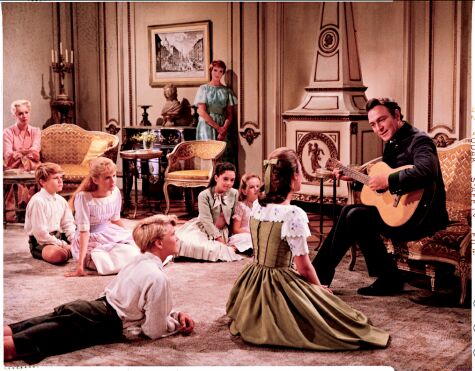Was “Edelweiss” Based on an Austrian Folk Song?
Here is the latest in a series of examinations into urban legends about musicals and whether they are true or false. Click here to view an archive of the musical urban legends featured so far.
MUSICAL URBAN LEGEND: Rodgers and Hammerstein’s song “Edelweiss” is based on an Austrian folk song.
“Edelweiss” was the last song that Oscar Hammerstein ever wrote. In fact, he was suffering from stomach cancer as he and his partner, Richard Rodgers, worked on the song, the final addition to their latest play at the time, The Sound of Music.
The pair were looking for a song that would express the feeling of loss surrounding Captain von Trapp having to leave his native Austria because of the Nazis. They wanted a song that could be performed as a folk song since the actor portraying von Trapp, Theodore Bikel, was an accomplished folk guitarist.
They settled on a song that was based on the German myths about the Edelweiss flower – a beautiful flower that young suitors would climb the Alps to get to prove their love for their sweethearts.

This matches the mood of the musical well, because it is a symbol of their homeland, but it is also something that you find on the Alps, and the von Trapps are about to travel over the Alps (in case you know nothing about The Sound of Music, it is about an Austrian Captain who is a widower with seven kids – he is depressed over the death of his wife, but slowly, due to the children’s peppy new governess, he learns to love music and life again – but all of this takes place against the backdrop of the Nazi rise to power, so the newly happy – and newly re-married to the governess, Maria – von Trapp escapes with his family over the Alps).
Here are the lyrics:
Edelweiss, Edelweiss
Every morning you greet me
Small and white, clean and bright
You look happy to meet me.Blossom of snow may you bloom and grow
Bloom and grow forever
Edelweiss, Edelweiss
Bless my homeland forever.
The “problem” is that Rodgers and Hammerstein did SUCH a good job evoking the feel of a folk song, a great many people believe that it WAS a folk song, and not written in 1959!

But it was.
The legend is…
STATUS: False
Thanks to David J. Benedict for the helpful information!
Feel free (heck, I implore you!) to write in with your suggestions for future urban legends columns! My e-mail address is bcronin@legendsrevealed.com






And it memory sweves right, didn’t Superman fly to the Alps to get that flower in the tv series for Superman’s Wife?
The biggest problem with Edelweiss is that it’s in English!!! If it were a real Austrian song it would be in Austrian Dialect. HOWEVER, although Austrian’s wouldn’t embrace that song typically or the movie/play it was written for, R&H did write a fantastic volk song. They deserve a lot of credit for that. It’s a beautiful story as well. The Sound of Music still holds up today as a great show.
I love that song Edelwiess and whenever I see the movie I sing along with christoher plummber. I really care for the song.
Thank You
Mrs Elizabeth J Bayaua
beautiful song beautiful movie. no one…no one sings it like Christopher Plummer.he did the movie and the song complete justice.very handsome and sexy man
Truth is, Christopher Plummer did not actually sing this song. That beautifully expressive voice you are hearing is playback singer Bill Lee who dubbed the singing voice of Christopher Plummer as Captain von Trapp in the 1965 film, and its soundtrack album, which included this song.
I have seen The Sound of Music many many many times and enjoy it even after 50 years. 1965 was the year I graduated from high school and now having a granddaughter who is 2 I have been singing Edelweiss to her as a bedtime lullaby. She loves it and will,ask me to sing it rather than rock a bye baby.
@ “Darren Rollins”:
_And which is the “Austrian Dialect” ? Urban american legends… The Austrians are same as the Bavarians, and they all speak Hochdeutsch.
Hello my name is Chris.
I was born and raised in Cologne (west germany).
No offense but as a German I have to say that it sounds quite ridiculous to consider this song to be a german folk song.
It’s written in english language.
Back in those days of the 60s only few german musicians performed in english and those were mostly covering the beatles 😀
I have to correct one major mistake made in this comment section:
“The Austrians are same as the Bavarians, and they all speak Hochdeutsch.”
No they are not … and they dont speak “Hochdeutsch”.
hoch = high
deutsch= german
Hochdeutsch = the most common dialect of german that is spoken everywhere EXCEPT Bavaria and Austria 🙂
Au Revoir!
Chris
It strikes me that the origin of the song is incidental. It is a somber song that represents a bright area being taken over by dictatorship.
That was always meant to be its meaning.
And that’s how it remains.